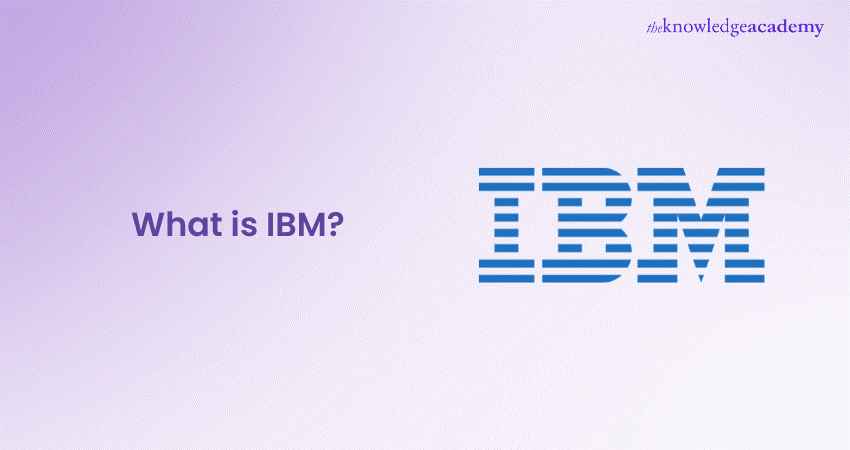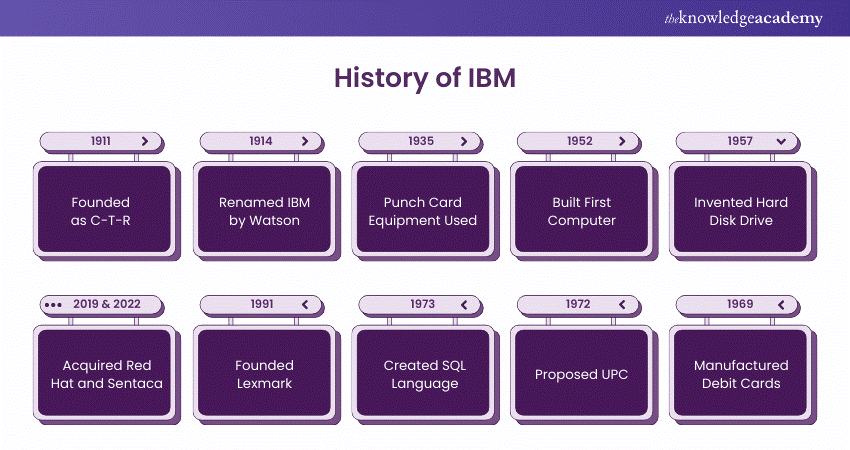We may not have the course you’re looking for. If you enquire or give us a call on 0800 446148 and speak to our training experts, we may still be able to help with your training requirements.
We ensure quality, budget-alignment, and timely delivery by our expert instructors.

Are you curious to know which is the world's oldest IT company? Undoubtedly, International Business Machines (IBM) stands as the leader in the IT business. It has given the technology fraternity a long trail of fascination and curiosity about the brand.
Let's unfurl the curtains from this curiosity by answering the crucial question: What is IBM, unfurl the long history behind this revolutionary IT multinational company and the goods and solutions associated with it. Wasting no time, let's dive in!
Table of Contents
1) What is IBM?
2) History of IBM
3) IBM Goods and Solutions
a) Server Hardware
b) Storage
c) Software
d) Services
e) Cloud
f) Cognitive Offerings
4) Conclusion
What is IBM?
International Business Machines is a multinational IT technology company with a global presence in over 175 countries. It is among the world's most significant industrial research organisations, with 19 research facilities in dozens of countries.
It primarily specialises in producing and selling computer hardware, middleware, and software to major global corporations. The AI-powered Watson platform, created by IBM, is used in numerous applications today. These applications include finance, healthcare, and customer service. Furthermore, IBM is a well-known IT services and consulting provider that helps businesses optimise their operations and implement new technologies. This answers your question on What Is IBM.
Recently, the company has stepped its efforts in Cloud Computing, Quantum Computing, Artificial Intelligence (AI), data and analytics, the Internet of Things (IoT), and Cybersecurity.
History of IBM
IBM was founded in 1911. At that time, it was named Computer-Tabulating-Recording (C-T-R) due to its specialisation in manufacturing machinery. These machines include industrial time recorders, tabulators, punch cards, and commercial scales.

In 1914, the company was led by Thomas J. Watson Senior. Watson shifted its primary products to large-scale business computing equipment, which resulted in the company being later renamed International Business Machines.
In 1935, IBM achieved a new feat when the US government used its Punch Card equipment to maintain the employment records of all American workers.
In 1952, the company built its first computer, 701, and spent the next two decades dominating the field of mainframes and minicomputers.
In 1957, IBM invented the hard disk drive, the revolutionary digital storage solution that is still used today.
Later, in 1969, the company started manufacturing debit cards and ID badges for banks, hospitals, government offices, etc.,
In 1971, IBM developed the first commercial Floppy Disks.
A year later, IBM presented the proposal for the first Universal Product Code (UPC), which was later adopted by retailers worldwide.
In 1973, the prominent IBM researchers Donald D. Chamberlain and Raymond F. Boyce wrote the first SQL programming language. These structured query languages (SQL) programmes help modern data scientists with data mining operations.
The company saw dramatic financial losses in the 1980s and 1990s when Personal Computer (PCs) sales declined. It lost billions of dollars during that period.
In 1991, the IBM company founded Lexmark- a printer, typewriter, and keyboard company.
As time went by, the company acquired numerous accolades. A few of these include Frances Allen, an IBM Research Fellow who became the first woman in 2006 to receive the Turing Award.
In 2019 and 2022, IBM acquired Red Hat and Sentaca, an open-source software company and a consulting firm.
Become an expert in managing IBM Cognos Business Intelligence software with IBM Cognos BI Administration (V10.2) Course – register today!
IBM Goods and Solutions
International Business Machines has a long history of delivering some of the notable IT products in the market. These products and solutions are illustrated below:
1) Server Hardware
The server hardware is among the most prominent sectors of IBM. The company started its primary production of mainframe-class computers. These classes of computers became the staple of the businesses at that time. Today, IBM is working toward Big Data and Analytics applications. It has also introduced the LinuxONE system, a hardware platform that uses its mainframe hardware.
2) Storage
IBM's storage devices include FlashSystem, all-flash arrays, Storwize systems, and other hybrid arrays. The company is pushing toward software-defined storage with the Storage Suite and Cleversafe Object Storage technology. Moreover, the company also made its mark in tape backup storage. These storage devices have enormous storage capacities in exabytes.
3) Software
In the software market, the company has delivered a wide array of products. These include IBM Cognos Analytics, IBM Statistical Product and Service Solutions (SPSS), WebSphere Application Server and MQ messaging middleware. BM also purchased the Maximo in 2006, Cognos in 2009, and SPSS in 2009. It remained an early adopter of the Linux OS. It
supported the enterprise version of RedHat Linux, SuSe Linux, and Canonical (Ubuntu) on its z Series of mainframes, LinuxONE server, and Power-based servers.
4) Services
IBM's service units include Global Business Services, which houses Big Blue's management consulting operations, and Global Technology Services. These services offered mobility, networking, business continuity and outsourcing. Later, IBM also acquired Bluewolf, a Salesforce channel partner and cloud consultant.
5) Cloud
IBM has ventured into numerous cloud solution companies. Among those include bare-metal computing, which runs through only the hardware, and the operating environments are manually installed. In 2017, IBM founded IBM Cloud by rebranding its cloud computing portfolio.
Conclusion
Since its establishment of IBM in 1911, it has delivered some of the world's cutting-edge software, hardware, and storage services. A career in IBM products and knowing about What Is IBM will open diverse opportunities for you in IT Infrastructure & Networking.
Develop Skills in IBM SPSS Statistics for data analysis and statistical research with SPSS Course- Register today!
Frequently Asked Questions
Where is IBM Headquartered?

IBM is headquartered in Armonk, New York, United States.
Is IBM a Publicly Traded Company?

Yes, IBM is a publicly traded company. Its stocks are listed on the New York Stock Exchange, the Chicago Stock Exchange, and outside the United States.
What are the Other Resources and Offers Provided by The Knowledge Academy?

The Knowledge Academy takes global learning to new heights, offering over 3,000 online courses across 490+ locations in 190+ countries. This expansive reach ensures accessibility and convenience for learners worldwide.
Alongside our diverse Online Course Catalogue, encompassing 19 major categories, we go the extra mile by providing a plethora of free educational Online Resources like News updates, Blogs, videos, webinars, and interview questions. Tailoring learning experiences further, professionals can maximise value with customisable Course Bundles of TKA.
What is The Knowledge Pass, and How Does it Work?

The Knowledge Academy’s Knowledge Pass, a prepaid voucher, adds another layer of flexibility, allowing course bookings over a 12-month period. Join us on a journey where education knows no bounds.
What are the Related Courses and Blogs Provided by The Knowledge Academy?

The Knowledge Academy offers various IT Infrastructure & Networking Courses including the IBM I2 Analyst's Notebook Premium Module and IBM Cognos BI Administration (V10.2) Courses. These courses cater to different skill levels, providing comprehensive insights into Linux Administration and more.
Our IT Infrastructure & Networking Blogs cover a range of topics related to IBM Courses, offering valuable resources, best practices, and industry insights. Whether you are a beginner or looking to advance your IT development skills, The Knowledge Academy's diverse courses and informative blogs have got you covered.
Upcoming IT Infrastructure & Networking Resources Batches & Dates
Date
 IBM I2 Analyst's Notebook Premium Module
IBM I2 Analyst's Notebook Premium Module
Fri 16th May 2025
Fri 11th Jul 2025
Fri 19th Sep 2025
Fri 21st Nov 2025
Fri 6th Feb 2026
Fri 20th Mar 2026
Fri 15th May 2026
Fri 17th Jul 2026
Fri 25th Sep 2026






 Top Rated Course
Top Rated Course



 If you wish to make any changes to your course, please
If you wish to make any changes to your course, please


